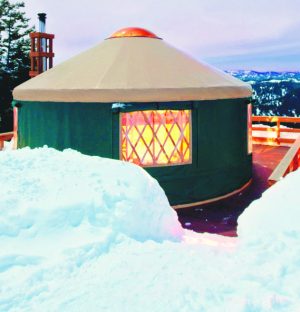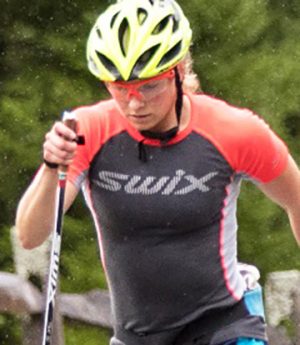August 06, 2018 (Rumford, Maine) – On July 27 a Celebration of the Life and tribute was held at Black Mountain Lodge for legendary Nordic ski pioneer, leader and icon, Wendell “Chummy” Broomhall, who passed away this past December.
![Chummy Broomhall inspired generations to serve the sport he loved encouraging folks to set lofty goals and go after them. [P] Chisholm Ski Club](http://skitrax.com/wp-content/uploads/2018/08/Chummy-DSCF0296-525x394.jpg)
![Chummy's jacket. Lite blue from Squaw Valley Olympics. He was Chief of Comp for XC and biathlon [P] Peter Graves](http://skitrax.com/wp-content/uploads/2018/07/Jacket-squaw-valley-Olympics-IMG_7680-copy-525x394.jpg)
Amazing Legacy of Chummy Broomhall
Inspirational Pioneer and Leader
by Peter Graves
This past December, the amazing Chummy Broomhall celebrated his 98th birthday surrounded by family and friends. It was a special, loving time. Not many are given the gift of longevity, and he appreciated that he had lived a good, rich life. On Dec. 30, 2017, he passed away quietly and at peace.
Mention the name Chummy Broomhall and most Nordic folk might call him a legendary Olympian, coach, innovator and icon. Throughout his 98 years, he was all these things and more. I was first introduced to Chummy in the late 1960’s by my high-school coach Bucky Broomhall, his brother (the entire Broomhall family is a pleasure to know).
![Broomhall's love affair with winter and skiing began with the fabled 10th Mountain Division. [P] Broomhall Family Collection](http://skitrax.com/wp-content/uploads/2018/08/Chummy-IMG_5084-525x394.jpg)
His words and his kind eyes brought me back to an earlier time. In many ways, he was a high-profile personality, though not because he wanted to be. In fact, his quiet, self-sufficient manner suggested that he was such only in service to his love of Nordic skiing. He told me that cross-country skiing had given him so much that he always felt the need to give back in return. And during his long life, return the favour he did, and Nordic skiing is so much richer for it. His many lifelong accomplishments are simply too extraordinary to ignore.
Born Wendall Broomhall on Dec. 3, 1919 in Mexico, Maine, Chummy was the middle child of 15 siblings. He grew up on a farmstead, riding horses and learning the value of work, cleaning out horse stalls as a young child. In his youth, he worked hard as well, spending much of his time as a logger.
To the origin of his nickname, he revealed, “I was first called Chubby because I was a chubby kid, but as I thinned out, the kids changed it to Chummy.” To my mind, Chummy suited him perfectly.
![Broomhall became one of the lead ski instructors for his army unit and played important roles in key campaigns in Italy and on the Aleutian Islands.[P]](http://skitrax.com/wp-content/uploads/2018/08/Chummy-Army-IMG_5070-1.4-525x394.jpg)
“It was,” as son Scott recalled, “the beginning of his love affair with winter and skiing.”
The brothers were both expert skiers and racers, so joining this particular outfit made plenty of sense. Chummy told me he wanted to be an ordinary soldier, but the fate would have none of that. He became one of the lead ski instructors for the unit. He and his brother played important roles in key campaigns, including in heavy fighting at Monte Cassino in Italy and on the Aleutian Islands in Alaskan territory.
One of several tough campaigns that Chummy took part in and clearly recalled was during the latter stages of World War Two, a 123-day siege against heavily fortified German troops deep in the mountain peaks and ridges around Monte Cassino. The series of four assaults by Allied troops commenced on Jan. 17, 1944. “Digging foxholes in that kind of terrain was simply out of the question; it was too rocky,” he noted.
![Following the war, Broomhall became a member of the US Ski Team from 1947-1954 and raced at the 1948 and 1952 Olympic Games. [P]](http://skitrax.com/wp-content/uploads/2018/08/Chummy-Army-IMG_E5069.2-525x394.jpg)
Chummy was also a member of the US Ski Team from 1947-1954. He made the U.S. Olympic team in 1948 and again in 1952. At the 1948 Olympic Games, he was the only “special runner” included on the squad, with the remainder of the team comprised of Nordic-combined athletes. In Oslo, Norway in 1952, among his teammates were noted skiers John Burton, Tom Jacobs, Johnny Caldwell and George Hovland.
A lack of snow for the U.S.-hosted 1950 FIS World Nordic Championships in Lake Placid, N.Y. saw the event moved to Rumford, Maine on little notice. Snow-drenched Rumford came to the rescue, as it had done before, it being in a natural snowbelt. The opening ceremony for all events was conducted in Lake Placid, then athletes and coaches jumped into their vehicles and drove to Rumford for the Championships’ Feb. 3 start.
Though Chummy on was the National team for the event, he and the Rumford community proved indispensable. “It was the legendary things he did that really drew me to him,” said Andy Shepard, current president and CEO of the Outdoor Sport Institute. “I mean, what he did was simply unbelievable. Chummy rallied the Rumford community to take on this event in 1950, and he was on the National team at that time.
![In 1981 Broomhall was inducted into the U.S. Ski Hall of Fame in recognition of his lifelong achievements in ski sport. [P] Broomhall Family Collection](http://skitrax.com/wp-content/uploads/2018/08/Chummy-IMG_E5076-525x692.jpg)
It proved to be a Rumford miracle. The timing crews relocated from Lake Placid to Rumford, but the rest of the team was organized locally. It was a moving example of a small town with a “can do” spirit under one man’s leadership. Some trails were cut only the week before in a backbreaking effort to have an 18-kilometre loop. The races began in front of the high school, with some of the track (no longer in existence) following the now-well-traveled Route 2.
There were four days of racing with nine nations attending and an estimated crowd of approximately 2,000 each day. As a small token of their appreciation, the Swedish team donated 50 pairs of racing skis to Rumford’s famed Chisholm Ski Club (one of the nation’s oldest ski clubs), which helped to energize its already growing youth program.
In the spring of 1959, the head of the 1960 Squaw Valley Olympic Winter Games, Alex Cushing, hired Chummy to serve as Chief of Events for cross-country and for the first-time Olympic appearance of biathlon. It was to be a two-year Californian gig. He gave up a good job at Hood Diary, as, once again, the Olympics served as a siren song enticing him westward.
![Chummy Broomhall served as Chief of Events for cross-country and for the first-time Olympic appearance of biathlon at the 1960 Squaw Valley Winter Games. [P]](http://skitrax.com/wp-content/uploads/2018/08/Chummy-Tahoe-IMG_E5074.2-481x760.jpg)
The courses were rolled with farm equipment, which proved a massive timesaver, enchanting the gathered European throng. By every measure, the Games were a huge success and put Squaw Valley on the map. Walt Disney’s creative expertise was reflected in his choreographing the opening ceremonies and IBM undertook the data-processing, all culminating in vast display of American ingenuity.
At Squaw Valley, famed Swedish champion Sixten Jernberg gave Chummy a pair of his skis, a deeply personal gift and a token of his friendship. Chummy was thrilled, but, sadly, the skis were later stolen. He still recalled these events many years on.
Merrill and Chummy’s collective imagination and Yankee practicality spurred some magical, innovative thinking that went on to change Nordic skiing. Chummy changed it by not only being an impactful organizer and athlete, but also by being a coach and mentor.
A graduate of Fort Lewis College in Durango, Colo. and a former All-American and Olympian in Nordic-combined, Jimmy Miller, also a native of Mexico, Maine, recalled that Chummy could communicate without saying much, and was, most of all, a nurturing coach. “Chummy always made you feel special. It didn’t matter how much talent you had. He taught us you never give up, no matter what happens in a race. I loved it when he said that it’s not your equipment that makes you fast, but your heart. He was always present in our lives, whether it was when making tracks and trails or through his excellent coaching.”
Miller was just one of legions of Chummy fans around the country. He noted that Chummy had unique qualities that are in short supply these days: “First, he mined the goodness and talent of people, and loved them like his own. He has the magical power to make you feel special. He had respect for the sport, and people had a respect for him that was legendary and universal. Athletes and people were just attracted to him. He also encouraged us to set lofty goals and go after them.”
![Chummy Broomhall was a legendary Olympian, coach, innovator and icon who's lifelong accomplishments in cross-country skiing were extraordinary. [P]](http://skitrax.com/wp-content/uploads/2018/08/Chummy-Awards-IMG_E5081.2-525x394.jpg)
Once again, the pair inspired hundreds of dedicated volunteers. They also relied on innovation and snow-farming techniques, showing their ingenuity by having snow hauled from a huge pile at the biathlon centre to the cross-country-ski trails across the street and using manure spreaders to distribute it. The small village of Lake Placid again hosted the Winter Games, and the course crew did the near-impossible, making a world-class impression along the way.
In 1981, Chummy was inducted into the U.S. Ski Hall of Fame in recognition of his lifelong achievements in ski sport.
Chummy inspired generations to serve the sport he loved. He was generous too, over the years donating approximately 300 acres of land for the trail network at Maine’s Black Mountain. He loved his volunteers and treated each one like gold, and they would go to the ends of the earth and back for Chummy to make a race happen.
Another who knew Chummy well was Dan Warner, a longtime official and volunteer at Chummy’s famed Chisholm Ski Club. “Chummy was many things, but, above all, he was a mentor, and I was lucky enough to have him play a huge role in my younger years of becoming a race official. He did that for everyone,” Warner, a former International Ski Federation technical delegate and Olympic official, recalled. “He always told me to surround myself with great, talented people, and now, when folks ask why I officiate races, I say that Chummy did it for me, so I’m happy to do it for the skiers of today. Chummy motivated me to do my best.”
![Broomhall's immense contributions include the development of the Black Mountain Ski Area in Rumford, Maine. [P]](http://skitrax.com/wp-content/uploads/2018/08/Chummy-Black-Mtn.2-525x394.jpg)
Again, the words of Miller, whose late brother Pat Miller, a former University of Utah head coach, also grew up alongside Chummy and shared a deep affection for him: “You know, Chummy had an OldWorld love of sport about him. He had the ‘it’ factor. He taught us all by example how you take care of, with love and attention, your family, your ski club and your friends. Chummy taught the world of skiing that, with love of the sport and care of mankind, anything is possible.”
No greater words are needed, no tribute more sincere, all for a man who played a major role in helping Nordic skiing grow and flourish. A true lion of winter sport has passed, and those who were touched by Chummy are among his greatest legacies. Those of us inspired by him will have that blessing forevermore.






![National camp action [P]...](https://skitrax.com/wp-content/uploads/2019/08/Duluth-4-2019-08-08-at-10.46.51-AM-300x246.png)
![Matt Liebsch on the CXC Elite Team [P] CXC...](https://skitrax.com/wp-content/uploads/2019/08/Matt-Liebsch-CXC.2-525x700.4-300x267.jpg)
![Dan LaBlanc [P]...](https://skitrax.com/wp-content/uploads/2019/08/Dan-LaBlanc-img_1855.3.jpg)

![Peter Graves gives the eulogy [P] Cami Thompson Graves](http://skitrax.com/wp-content/uploads/2018/07/Graves-eulogy.Cami-Thompson-Graves-IMG_7685-copy-525x394.jpg)
![Rev Doug Dunbar, a member of the Chisholm Ski Club, officiating the service [P] Peter Graves](http://skitrax.com/wp-content/uploads/2018/07/Rev-Doug-Dunbar-IMG_7682-copy-525x394.jpg)
![Chummy's Granddaughter Heidi Broomhall [P] Peter Graves](http://skitrax.com/wp-content/uploads/2018/07/granddaughter-Heidi-Broomhall-IMG_7687-copy-525x394.jpg)
![Chummy's bib from 1952 Oslo Winter Olympics [P] Peter Graves](http://skitrax.com/wp-content/uploads/2018/07/Bib-from-1952-OsloIMG_7679-copy-525x394.jpg)